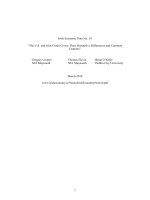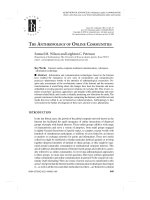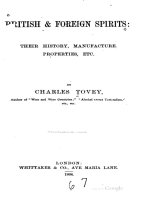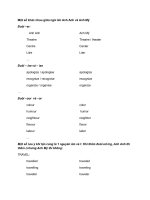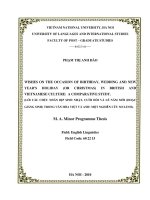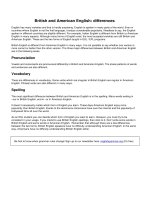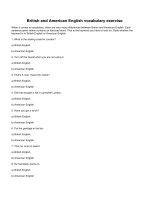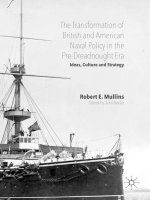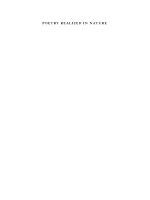Samuel beckett british and irish authors
Bạn đang xem bản rút gọn của tài liệu. Xem và tải ngay bản đầy đủ của tài liệu tại đây (4.68 MB, 190 trang )
BRITISH AND IRISH AUTHORS
Introductory critical studies
SAMUEL BECKETT
While providing a critical introduction for the student of Samuel Beckett's
work, and for other readers and theatre-goers who have been influenced
by it, this study also presents an original perspective on one of the century's greatest writers of prose fiction and drama. Andrew Kennedy links
Beckett's vision of a diminished humanity with his art of formally and
verbally diminished resources, and traces the fundamental simplicity and coherence - of Beckett's work beneath its complex textures. In a
section on the plays, Dr Kennedy stresses the humour and tragicomic
humanism alongside the theatrical effectiveness; and in a discussion of the
fiction (the celebrated trilogy of novels) he relates the relentless diminution of the 'story' to the diminishing selfhood of the narrator. An introduction outlines the personal, cultural and specifically literary contexts of
Beckett's writing, while a concluding chapter offers up-to-date reflections
on his oeuvre, from the point of view of the themes highlighted throughout
the book.
This study, complete with a chronological table and a guide to further
reading, will prove stimulating for both beginners and advanced students
of Beckett.
BRITISH AND IRISH AUTHORS
Introductory critical studies
In the same series:
Richard Dutton Ben Jonson: to the first folio
Robert Wilcher Andrew Marvell
David Hopkins John Dryden
Jocelyn Harris Samuel Richardson
Simon Varey Henry Fielding
John Barnard John Keats
Elaine Jordan Alfred Tennyson
Peter Raby Oscar Wilde
John Batchelor H. G. Wells
Patrick Parrinder James Joyce
Martin Scofleld T. S. Eliot: the poems
SAMUEL BECKETT
ANDREW K. KENNEDY
Department of English
University of Bergen
The right of the
University of Cambridge
to print and sell
all manner of books
was granted by
Henry Vlll in 1534.
The University has printed
and published continuously
since 1584.
CAMBRIDGE UNIVERSITY PRESS
CAMBRIDGE
NEW YORK
PORT CHESTER
MELBOURNE
SYDNEY
Published by Press Syndicate of the University of Cambridge
The Pitt Building, Trumpington Street, Cambridge CB2 1RP
40 West 20th Street, New York, NY 10011-4211, USA
10 Stamford Road, Oakleigh, Melbourne 3166, Australia
© Cambridge University Press 1989
First published 1989
Reprinted 1991
British Library cataloguing in publication data
Kennedy, Andrew K. (Andrew Karpati), 1931Samuel Beckett
1. English literature, Beckett, Samuel,
1906-Critical Studies
I. Title
II. Series
828'.91209
Library of Congress cataloguing in publication data applied for
ISBN 0 521 25482 5 hardback
ISBN 0 521 27488 5 paperback
Transferred to digital printing 2004
GG
For Ruby Cohn
Contents
Acknowledgements
Chronology
Note on text
Introduction
Ireland
Paris
Vision and form: the tightening knot
page
ix
xi
xiv
1
4
7
11
PART I THE PLAYS
1 Contexts for the plays
17
19
2
24
25
35
42
Waiting for Godot
Action in non-action
Character and dialogue
Theatre and structure
3
Endgame
'Nearly finished'
Character and dialogue
Theatre and structure
4
Krapp's Last Tape
A dialogue of selves
Theatre
5
Happy Days
The celebration of decay and survival
Theatre and structure
6
Play
As if telling a story
Voices in limbo
Language, rhythm and theatre
7
PART II THE TRILOGY OF NOVELS
Contexts for the fiction
8
Molloy
The quest
The quest for the quester
Narrative, voice and writing
47
48
53
61
67
68
74
76
77
83
92
83
94
97
101
103
109
109
114
118
CONTENTS
9 Malone Dies
The final diminishment of the self
Narration as self-reflection and failure
10 The Unnamable
125
126
131
139
PART III CONCLUSION
11 Concluding reflections
153
155
Notes
Select bibliography
Index
164
166
169
vin
Acknowledgements
I wish to thank the Norwegian Research Council for Science and
the Humanities for a grant that enabled me to complete this study
at Clare Hall, Cambridge - that ideal working place - in the
spring and summer of 1987.
Chronology
The following is a selective chronology of Beckett's life with the
dates of publication or first performance of principal works. For
fuller details of the works discussed at length in this book, see the
Select bibliography on p. 166.
1906
Born at Foxrock, near Dublin, allegedly on Good Friday, 13 April
1920-3 Portora Royal School, Ulster
1923-7 Trinity College, Dublin. Read Modern languages
(English, French and Italian)
1927-8 Taught for two terms at Campbell College, Belfast
1928
Began two-year exchange fellowship at l'Ecole Normale Superieure as Lecteur d'anglais. Met Joyce
1929
Published short story 'Assumption' in transition,
16-17; and first criticism, 'Dante . . . Bruno. Vico
. . . Joyce', in Our Exagmination
1930
Published Whoroscope (poem on Descartes), which won
a £10 prize from Hours Press
1931
Published Proust in London (criticism). MA Trinity
College, Dublin, and resigned from post of Assistant
in French there
1932
After six months in Kassel began a period of wanderings in Germany, France, England and Ireland.
Began Dream of Fair to Middling Women, which draws
on these journeys
1933
1934
1935
1937
1938
Father died, leaving Beckett a £200 annuity.
Lived for about two years in Chelsea, London, supplementing his annuity by reviewing and translation
Published More Pricks than Kicks (short stories).
Began analysis at Tavistock Clinic
Published Echo's Bones (collection of thirteen poems)
Settled in Paris
Published Murphy in London (a novel in English,
xi
CHRONOLOGY
1939
1941-2
1942
1945
begun in 1934 - rejected by forty-two publishers
before acceptance by Routledge)
Stabbed in a Paris street, 7 January. Visited in
hospital by pianist Suzanne Dumesnil, who later
became his wife
Returned to Paris, from a visit to Dublin, at the outbreak of the Second World War
Worked in the French Resistance with his friend
Alfred Peron
The Gestapo arrested Peron; Beckett and Suzanne
Dumesnil fled from Paris to Roussillon in unoccupied
France. Began writing Watt
Worked for Irish Red Cross in Normandy. Received
Croix de Guerre and Medaille de la Resistance for his ser-
1946
1947
1948
1949
1950
1952
1953
1955
1956
1957
1958
vice in war-time France. Visited Ireland, and finished
Watt in Dublin
Began his most creative period, writing in French,
with Mercier et Camier (novel) and Nouvelles ('La Fin',
'L'Expulse', 'Le Calmant' and 'Premier Amour' stories)
Completed Molloy and Eleutheria (unpublished play)
Completed Malone Meurt
Completed En attendant Godot - in January
Published Three Dialogues with Georges Duthuit in
transition
Completed L'Innommable. The trilogy of novels was
accepted for publication by Editions de Minuit in
November.
Beckett returned to Dublin before his mother's death
in August
En attendant Godot published in Paris
En attendant Godot first performed at the Theatre de
Babylone, Paris.
Waiting for Godot produced in London. Began Fin de
Partie {Endgame)
Waiting for Godot published in London
All that Fall broadcast by BBC Third Programme.
World premiere of Fin de Partie (in French) in London
World premiere of Krapp's Last Tape in London
xii
CHRONOLOGY
1961
World premiere of Happy Days in New York.
Comment c'est {How It Is) published in Paris
1963
1969
World premiere of Play (in German) in Ulm
Awarded the Nobel Prize for Literature, 23 October.
Accepted the award but did not attend the prizegiving ceremony in Stockholm
Lessness published in London
World premiere of Not I in New York
That Time and Footfalls premiere at the Royal Court
Theatre to celebrate Beckett's seventieth birthday
1970
1972
1976
1977
1981
1982
1984
1986
Ghost Trio and . . . but the clouds broadcast on BBC
Television
/// Seen III Said published in New Yorker. World
premiere of Rockaby and Ohio Impromptu in Buffalo and
at Ohio State Beckett Symposium respectively
World premiere of Catastrophe at Avignon Festival
Collected Shorter Plays of Samuel Beckett published in
London
Beckett's eightieth birthday celebrated with conferences in Paris, New York, and Stirling, unattended
by Beckett
Note on texts
References to Beckett's texts are to the following single-title
editions:
Waiting for Godot, Faber, London, Second edition 1965, reprinted
1981
Endgame, Faber, London, 1958
Krapp's Last Tape, Faber, London, 1959
Happy Days, Faber, London, 1963
Play, Faber, London, 1964
Murphy, Calder, London, 'Jupiter Book', 1963
Molloy, Calder, London, 'Jupiter Book', 1966
Malone Dies, Calder, London, 1975 (new edition of Calder text
first published in 1958)
The Unnamable, Calder, London, 1975 (new edition of Calder text
first published in 1958)
Introduction
Beckett at eighty plus is eminently visible - a face and a name
appropriated by the world - as the leading non-realist Western
writer of the second half of our century. This visibility is itself
ironic, for he had chosen reclusive privacy in living, and the isolation of the self as an obsessive subject. The narrators of his fiction
and the protagonists of most of his plays are incurable soliloquisers. The most memorable image in his only film is a man
(played by Buster Keaton) for ever in retreat from a potential
observer. The writings of his youth and early manhood were mostly
neglected in the thirties and forties and are, with the exception of
Murphy, not widely read today. Again, the ageing writer of the
seventies has produced perfect yet highly compressed 'minimalist'
texts which are not likely to become familiar, in the literal as well
as in the literary sense - preserving their strangeness beyond
reading and performance.
The fame of Waitingfor Godot (written in 1948 but first performed
only in 1953 in Paris and 1955 in London) began to transform
Beckett's situation - from the obscure avant-garde writer to the
world figure. That particular play, performed everywhere from
the San Quentin penitentiary to colleges of education, had become
a set book in secondary schools and a relative best-seller by the
1970s. Gradually the more elusive plays and novels also came to
attract world-wide attention and - a significant fact for new
readers and their guide - a vast array of criticism, comparable
only to the industry devoted to major writers of the past. The new
situation has brought with it the risk of over-interpretation: it is
possible that in Beckett criticism 'more is less', while the inner law
of Beckett's work is 'less is more'.
The essential contours of the Beckett terrain will be traced here,
not through highly specialised standpoints, but through a sharp
focus on the map of contexts leading to an exploration of the
ground, the individual works. We find then an overall unity: a
vision of diminishing human faculties (a tragicomic failing and
falling) written into texts of diminishing language, ever more daringly lessened forms of drama and fiction.
INTRODUCTION
It now requires an imaginative effort to reconstruct the original
contexts of Beckett's writing - which often cannot be read unaided
out of the text of this or that play or novel. The roots of Beckett's
art (both the vision of the world and the avant-garde poetics)
stretch back to a now almost vanished era: the great fertile phase
of modernism in the twenties, accelerated by the First World War.
The modernist heritage embraces: a total commitment to writing
as an art (which in Beckett is later accompanied by a total scepticism about the possibilities of communication and expression),
and the imperative of 'making it new' so that each new work is
a venture into the unknown. The central importance of language
in all modernist writing becomes, in Beckett, a dangerous immersion in language as a creative/destructive element, language as the
stuff that makes up, or else annihilates, the world and the self.
(This is the polar opposite of the belief that language comes to us
more or less ready-made to represent the world.) Even Beckett's
all-encompassing pessimism and spiritual despair - religious
symbols used without a structure of belief, the pervasive mysticism
of 'nothingness' - spring from a sensibility nearer to the age of
Joyce, early Eliot and Kafka, than to the moods and modes of
writing dominant now.
The feeling/or Beckett as a contemporary writer is understandable
and even helpful in so far as his long creative work - and his
impact - stretch into the present. But there is in this seeming contemporaneity also an element of delayed reaction or telescoping:
creative maturity reached relatively late in works published with
delay (from the mid-fifties on in Britain and America) and then
absorbed slowly, in a series of delayed responses, by the wider
reading/theatre-going public. Even today public appreciation of
Beckett is often superficial or uncomprehending; at the same time,
some of his admirers have been tempted to turn him into a cult
figure. (In this study evaluation will be mostly implicit, working
towards conclusions.) Meanwhile, over three decades Beckett's
work has 'kept up with the age', as can be seen, in one conspicuous aspect, in the artistic transformation of several new communicative tools and media: the tape recorder (in Krapp's Last
Tape), radio (in All that Fall and other plays), film and television
(the close-up and the voice-over, in EhJoe and in the late plays - That
Time and Rockaby). He has worked closely with a number of gifted
actors in three countries (including Billie Whitelaw and Patrick
Magee in Britain) and, despite his reclusiveness, he keeps responding promptly to an endless succession of scholarly enquirers. For
INTRODUCTION
a seemingly apolitical writer, Beckett has also shown compassionate awareness of contemporary political conditions: Catastrophe
(1982) is dedicated to the persecuted Czech playwright Vaclav
Havel, and the short play dramatises oppression. (In war-time
France, Beckett, a citizen of neutral Ireland, worked for the
Resistance.) Nevertheless in Beckett's work we are entering types
of vision and form no longer of our time, though much in the
achieved work is likely to remain challenging for all time.
Biography, always only partially and controversially relevant to
the study of a writer's work, is particularly problematic as a context for Beckett's work. For Beckett has always endeavoured to
distance and transform the autobiographical elements which are,
without doubt, a main source of his creative work. At times the
author behind the narrator/protagonist becomes visible or audible
- the erudite London-based Murphy, the vision 'at the end of the
jetty' replayed on Krapp's tape, and, in the late work, the voices
returning to the 'old scenes' of Dublin bay in That Time.1 The
biographical context will here be highlighted where it is most
relevant - especially in the nurturing literary environments of
Ireland and Paris - but not given as a self-contained or primary
history.
Similarly, the philosophical context - that is to say, the 'raw
ideas' from Descartes to Sartre that Beckett undoubtedly gathered
and cooked - is to be seen less as a set of intrinsically fruitful
ideas and more as the material of fiction-engendering speculations. Beckett imaginatively incorporates everything at hand transmuting a vast array of concepts and conceits from his reading
and professional scholarship (Dante to Proust). Religious ideas are
used as fragments in a creative writer's mythology: with ineradicable traces of a Christian education ('We were brought up
like Quakers')2 leading to a life-long quest for essential meaning,
not to be found. Every work has a religious or metaphysical
dimension, from the subtle 'negative way' of the exploring self in
the trilogy to the cruder theatrical voice of Hamm (playing the role
of the post-Nietzsche atheist) - 'The bastard! He doesn't exist!'
{Endgame, p. 38). What is unique is the supreme fiction that turns
so many disparate ideas, impulses, beliefs and unbeliefs into a new
and personal mythology. This book does not aim to subordinate
the Beckett mythology to any particular environment or system
or ideas, but rather to find the points where the writing and the
ideas connect.
INTRODUCTION
Ireland
The Irish writer in exile can be seen as dwelling in a kind of noman's-land with persistent echoes of Ireland - in terms of mental
and fictional landscape, character and theme and, above all,
language and style. Beckett takes after Joyce in this respect, in
having preserved the indelible marks of 'the Irish connection',
even though he has gone further than Joyce in his separation
from his native country: by abandoning Dublin as the specific
imaginative setting for his works after his published early collection of stories, More Pricks than Kicks (1934), and by deciding to
write the trilogy and two of his epoch-making plays in French.
Beckett's self-exile thus shows the peculiar intensities of linguistic
exile (also seen, in significantly different ways, in the writings of
Conrad and Kafka) on top of the culturally 'destabilising' effect
of being Irish in the modern world. So when we look at the Irish
background, we need to see not only the firm contours of a
particular upbringing and landscape, but also the gradual and less
distinct transformation of those contours in a long working life
spent mostly in Paris.
Like the majority of Anglo-Irish writers (but unlike Joyce)
Beckett came from a Protestant and well-to-do middle-class family.
He was brought up in a substantial house in leafy Foxrock near
Dublin, and received the education of the establishment - at Portora Royal School and Trinity College Dublin - intended by his
parents as a preparation for a prosperous career, preferably in the
family business. There is no record of a major trauma in his
childhood (comparable to the famous conflict between Kafka and
his father), though the relationship between a dominating mother
and a withdrawn if not already reclusive son is prime material for
the biographer. Nor were the child and the young man subjected
to the turmoil of war and revolution, though he did watch the fires
of the Easter 1916 rebellion from the hills of Dublin, and was moved.
The legend, started by Beckett himself, that he was born on Good
Friday, 13 April in 1906 cannot be proved; the birth certificate is
made out for May that year. But even if he was born on Good Friday, it is the orderliness and the sheltered 'old style' gentility of
a pre-First World War childhood, at the relatively quiet edge of
the Western world, that strikes one. His early studies were not in
any way outstanding - though he did excel at playing cricket. It
seems that the scholar and gifted linguist emerged only in his third
year at Trinity, and the writer much later. It was his mastery of
INTRODUCTION
French that made his professor recommend him for the muchcoveted two-year position as lecteur at the Ecole Normale
Superieure in Paris (1928-30), with the expectation that he would
grow (or dwindle) into a university professor in romance
literature. Beckett started two research projects (including one on
Descartes, whose body-mind dualism came to obsess him) and he
tried university teaching for a brief spell, only to resign (in 1931),
later pleading, with singular integrity: 'how can I teach what I do
not understand'. From that date Beckett became just one of the
wandering scholars and semi-obscure artistic exiles (settling permanently in Paris in 1937), flanked by a host of dilettanti, with
endless experimentation and uncertainty about the ultimate value
of anything written.
Can we define what was the most lasting Irish heritage? Added
to the habit of travelling with a set of unanswerable questions theological and metaphysical questions seen existentially - three
clusters of deeply ingrained experience stand out: the Dublin
theatre, the countryside around Dublin and the language - pure
Anglo-Irish, with its lyrical bent and latent instability.
Dublin, a small-scale cultural capital, offered Beckett a substantial introduction to modern drama: the Irish dramatists at the
Abbey (including Yeats, Synge and O'Casey), the new European
dramatists at the Gate, with melodrama and vaudeville still thriving at lesser theatres (Queen's, Theatre Royal and the Olympia).
Beckett thus had the good fortune of being introduced early to
three essential elements in his own future drama: Irish (the poetic
prose of Synge and the non-realism of Yeats), modern theatricality
(including Pirandello) and the popular theatrical tradition.
Significantly, Beckett was also fascinated by the cinema: Chaplin,
Laurel and Hardy and Harold Lloyd. His mature work includes
a filmscript, Film (1964), written for Buster Keaton. (For drama
generally see 'Contexts for the plays' below.)
The haunting presence of Irish scenery in Beckett's writing usually described in simple, lyrical language - will be noticed by
every reader. But as Beckett does not aim at topographical realism
(in any of the works studied here), we may well wonder to what
extent that particular 'influence of natural objects' matters in our
reading. For example, the island scenery in the final sections of
Malone Dies, against which are played out the exodus of inmates
by boat and the terrible massacre, is unmistakably Irish. It is now
possible to be more precise, and track down the course of the boattrip from Coliemore Harbour to Dalkey Island in the Dublin
INTRODUCTION
coastal area: photographs with matching texts from that novel can
be gazed at in The Beckett Country by Eoin O'Brien. 3 Is this
valuable knowledge? Well, the exact particulars of location are
clearly quite secondary. But the correspondence of feeling, landscape and language (the associated purity and lyricism) is an
essential element in Beckett's writing. So much so that certain
novels and plays - including Molloy, Waiting for Godot and Krapp's
Last Tape with its * Vision' on the jetty - transfer fragments of an
Irish landscape into the interior landscape of the characters. And
to miss that dimension would be to impoverish our reading.
Anglo-Irish as a particular literary language - with its purity
of diction mingling with playful rhetoric and wordplay - offers
a potential expressiveness beyond the reach of most types of standard twentieth-century (British) English. But it also has a greater
potential towards instability, partly through its richness, partly
through the insecure 'outsider' self-image of the writers of that
language. It is as though the Irish writer were writing a foreign
language when writing English - an insight already reached by
Stephen Dedalus in Joyce's A Portrait of the Artist as a Young Man or 'a learned language' in Yeats's phrase, or 'struggling with a dead
language', like Mrs Rooney in All that Fall, Beckett's all-Irish radio
play.4 Then a drive towards hyper-literary expressiveness is
accompanied by an acute and often painful consciousness concerning the fragility - or incongruity - of words uttered or written.
Even Bernard Shaw's titanic Victorian robustness was not free from
a sense of 'absurdity' in his uses of language. Beckett, the most
inward and critically language-conscious of all Irish-born writers,
moves towards an inner bilingualism even before he came to choose
actual bilingualism - that gift which is also a curse, a burden on
tongue, pen and consciousness. The mastery of more than one
language then reaches a precarious feeling for all language as a
destructive/creative element to be immersed in. Those who have
no direct experience of such a state must imaginatively acquire at
least some vicarious language pains. Beckett's inborn languageconsciousness was deepened by certain philosophies of language (he
is said to have read aloud to Joyce from Mauthner's Critique of
Language), and by the aesthetic distrust of ordinary language (which
Beckett inherited from the French symbolist poets).
The dislocations of language that follow are serious but, given
the playfulness of the Anglo-Irish tradition, hardly ever solemn.
Humour runs across almost every episode or scene in Beckett's
novels and plays. Even when 'it is no laughing matter', a
INTRODUCTION
tragicomic language is created that is constantly at play, as if acting
out the mutilated Nell's response to Nagg's laughter (in one of the
ashbin dialogues in Endgame, p. 20): 'Nothing is funnier than unhappiness, I grant you that. But - '
Paris
Paris between the two World Wars was still the major centre for
innovation in the arts of the West and the cultural melting-pot of
all movements as well as of nationals. It was also still a relatively
compact and inexpensive place for daily living and writing. Paris
in the years after the Second World War experienced the peculiar
intensities of a war-tortured survivor - quite distinct from victorious but quiescent London, or from Berlin and Vienna which
lay in ruins - spawning popular versions of philosophical existentialism as well as of Marxism, and remaining exceptionally receptive to non-realist writing in fiction as in the theatre. Beckett was
fortunate, then, in living through some of the modernist ferments
of Paris in the thirties (centred for him in the circle around Joyce
and transition magazine) and, in the post-war phase, settling down
in a 'siege' of seclusion in his old pre-war flat, to write, in French,
what can be regarded as the central works of his maturity - the
trilogy and the first two plays. It was in many ways a hospitable
cultural climate. Although it was still difficult for him to get
published or performed in Paris, it would probably have been
even more difficult in London (despite the publication of Murphy
there in 1938), especially as fiction and drama in the Britain of the
fifties tended to be dominated by versions of realism (for instance
Kingsley Amis, John Osborne).
Intellectual ferment and greater receptivity to his work were,
then, the principal windfalls of the Paris milieu. Beckett chose to
settle in Paris permanently in 1937, when he was over thirty, after
a period of restless Wanderjahre spent partly in Germany (drawn by
a beautiful cousin and by the culture, not by the rise of Nazism)
but mostly in London where he did not thrive. How deliberate was
the choice of residence can be seen from his destiny-conscious
decision to remain in France when the Second World War broke
out. Choosing Paris included a vote against Ireland, at first an
escape from home, country and religion (the Joycean pattern for
exile). But it was also a vote for the provocative conditions just
outlined, in a relative writer's haven which could turn into the
threat of vanishing 'inside the whale', in Orwell's phrase. What
INTRODUCTION
we have to recreate imaginatively here is the fusion, in the Paris
of the thirties, of at least three levels of experiment, in living as
in writing: the immediate relationship with Joyce, the retrospective critical immersion in Proust, and the ceaseless artistic
experimentation, from dada to expressionism and surrealism.
Beckett's relationship with Joyce was more than that of disciple
to master, it was in many ways a symbiotic interaction between
two very different word-intoxicated artists, between the diffident
young apprentice writer and 'the great writer' of the age. They
shared a cultural background, an obsessive interest in fictional
and verbal patterns pushed to the limits of art, as well as habits
of copious drinking and long silences. By the time Beckett met
Joyce - during his first stay in Paris, in his years at the Ecole
Normale Superieure (1928-30) - Joyce was working on his ultraexperimental novel Finnegans Wake (published in 1939), which
aimed at a hybrid super-language made of English words merging
with foreign words in a ceaselessly punning dream. Beckett was
one of those singled out (with the approval of 'the master') to write
a critical defence of Joyce's 'work in progress' in an argument in
which the exhaustion or deadness of the (English) language was a
cardinal point (see 'Vision and form' below). Beckett's Joycean
heritage includes the relentless pursuit of new and extreme positions in writing, sometimes reflected in local experiments such as
the unpunctuated final sequence of The Unnamable and of the
entire text of his last longer fiction, How It Is (1961). Nevertheless,
Beckett's long-term development can be seen as moving in a
counter-Joycean direction - towards greater simplicity, compression and diminishment, as is argued at several points in this study.
Beckett's involvement, as a very subjective critic, with Proust's
supreme novel, Remembrance of Things Past {A La Recherche du temps
perdu, 1913-27), is as important in the early Paris years, and in
its life-long consequence, as the living relationship with Joyce. For
the emphasis that Beckett gave, in the long essay, Proust (1931),
to Proust's vision and form is emphasis through distortion: intensifying the pessimism in Proust's vision by soaking it in
Schopenhauer's 'congenial' philosophy (the inescapable futility of
all willing and desiring), and understating Proust's impressionistic
delight in the surfaces of a brilliant if flagrantly flawed social
world. Implicitly, Beckett has begun to write his own artistic
manifesto in the guise of the Proust critic: seeing the novel as 'pure
writing' - formal or 'radiographic', the X-ray image replacing
the photograph. This prepares the way for Beckett's own aesthetic
8
INTRODUCTION
philosophy and his own experiments, a total fusion of subject matter and expression, vision and form.
Beckett's relationship with revolutionary changes in art especially with successive movements in the visual arts, expressionism, surrealism, etc. - can be only touched on here. The
overall effect was to push the young writer towards nonrepresentational forms of expression, and then towards abstraction. Yet we need to pause and reflect here, for words - unlike
colours and shapes, or for that matter sounds - cannot become
wholly non-representational or abstract, since they carry the
stamp (the referents) of the world's images and concepts into every
phrase or sentence. But Beckett was also haunted by certain
specific images of avant-garde art, for example, the woman buried
in sand in Dali's surrealist film Le Chien andalou (1929) may be seen
behind the dominant stage image of Happy Days (1961).5
The Second World War must have deepened Beckett's
awareness of suffering and of fearful uncertainty, as well as of the
instability of language - to some extent a shared experience
among survivors of the war. Beckett was a relatively 'privileged
observer' of the war: after joining a Resistance group in Paris and
escaping arrest, he lived in hiding in Vichy France, experiencing
both danger and long periods of waiting. He must have heard
reports of some of the extreme barbarities of the war in occupied
France - terror, torture and Nazi deportations - and news of
Auschwitz and the other death camps reached France early. One
of Beckett's Jewish friends had perished. And while Beckett has
never written directly about those extreme experiences (or turned
war experience into a moral fable like Golding's Lord of the Flies),
the imagery of a world that had run its course - a 'corpsed' world
- has found its way into Endgame. Earlier versions of the text of
that play were much nearer to raw experience than the version we
know, which has moved towards a universalising myth of negative
creation. But we may assume that the play - and much else in
Beckett's work - gains some of its power 'to claw' from the dark
experiences of the war years.
Thought in post-war France tended to be dominated by JeanPaul Sartre's existentialism, in its popular and simplified version
a 'vision of the world' that sees each self thrown into life without
definition, purpose or essence. In its technical version this
philosophy explores the total alienation of each person from others
(the other) and the 'nothingness' of the self as a pure consciousness
- separated from the world of things and actions. Such ideas
INTRODUCTION
clearly have some relevance to Beckett's vision, and, as already
suggested, created a favourable cultural climate for the reception
of his post-war work. But, I think, the direct influence of existentialist thought on Beckett has been exaggerated. One might as well
argue that Beckett did not 'need' the French versions of existentialism, for he had a version of his own already, made up of a
deeply felt sense of loss - in a world where God is absent - and
of a medley of philosophical ideas domesticated in his youth. From
Descartes came the isolated and solitary self thinking, 'I think
therefore I am', starting from a new, anxiously sceptical probing
of rationality; from the Irish Bishop Berkeley came the profoundly
tragicomic notion that if God does not see me, if nobody sees me,
I may not exist; and from Schopenhauer came the vision, akin to
Buddhism, that the desiring self does not exist in any 'real' sense,
except through suffering the painful consequences of wilful selfassertion. These, and related ideas, filtered through a questioning
yet deeply and obsessively feeling temperament, are quite enough
'philosophy' for a writer who is, in any case, not primarily
philosophical. Beckett is not presenting ideas but constantly
transmuting his own idiosyncratic versions of received ideas into
vision - like Dante in The Divine Comedy, above all in Purgatory.
But, unlike Dante, Beckett has no system of belief; on the contrary,
his novels and plays are all written against any system.
Beckett's decision to start writing in French and then to become
his own translator into English (assisted in the translation of
Molloy) is probably unique. Conrad could hardly expect to reach
a world reading public in his first language, Polish, Koestler in
Hungarian, Kafka in Czech; their choice of writing in English or
German comprised an element of communicative strategy on top
of subtler, private urgencies. But Beckett's choice of French after
the war had much more to do with an internal stylistic conflict the desire to 'write without style', as he once said. That sounds
paradoxical for, strictly speaking, writing and style are
inseparable Siamese twins. But Beckett admired the relatively
neutral 'styleless' writing of the classical period (best seen in the
tragedies of Racine) and he wanted to prune away the superabundant expressive potentials of English (Anglo-Irish): the prolific
word-stock, wealth of idiom and metaphor, 'the whirling words'
of the Hamlet world, with their pressure of incessant private
association. French must also have had affinities - in the Parisian
cultural environment we have sketched - with Beckett's ever
more intense search for experimental and abstract modes of fic10
